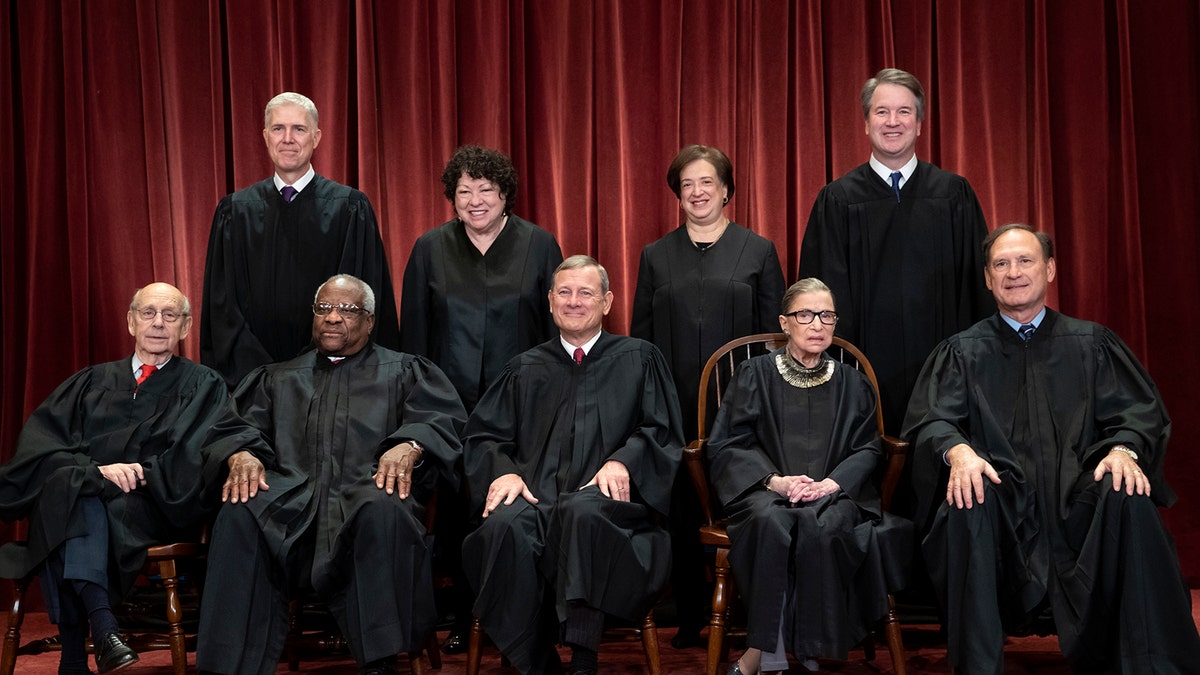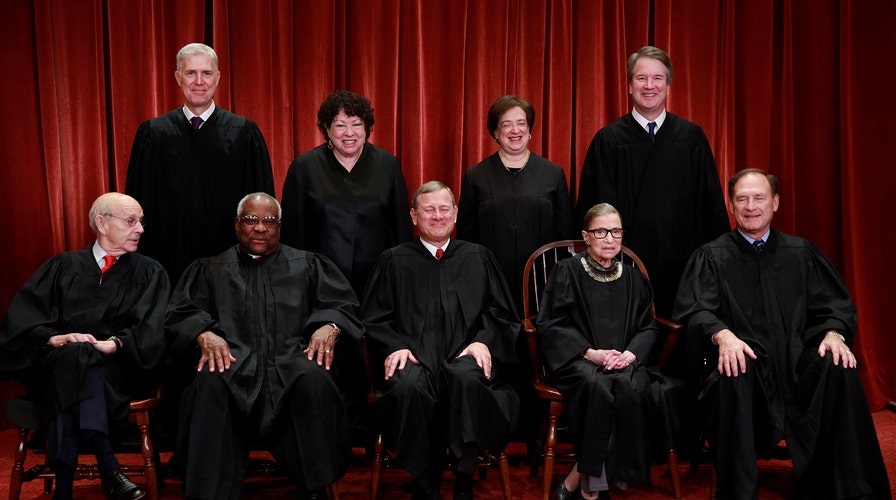Fox News Flash top headlines for May 4
Fox News Flash top headlines are here. Check out what's clicking on Foxnews.com.
Get all the latest news on coronavirus and more delivered daily to your inbox. Sign up here.
The Supreme Court on Monday held its first-ever remote oral argument session – which was streamed live for the general public, also a first – as it seeks to hear at least some of the cases on its docket for the latter part of its term after deciding not to hold in-person arguments because of the coronavirus pandemic.
Notably, Justice Clarence Thomas spoke during oral arguments for the first time since early 2019 and for just the third time in over a decade. Thomas asked his questions in a case deciding whether or not Booking.com could trademark its name.
"Could Booking acquire an 800 number that's a vanity number, 1-800-booking for example, that is similar to 1-800-plumbing, which is a registered mark?" Thomas asked the U.S. government's lawyer, Erica Ross.
After Ross' response, Thomas followed up: "That could be true, but I'd like you to compare this to Goodyear," Thomas said, referencing a past case. "In Goodyear, you had a generic term, but you also had an added term, such as company or inc, which any company could use. With Booking here there could only be one domain address dot com, so this would seem to be more analogous to the 1-800 numbers which are also individualized."
Thomas also asked questions to Booking.com's lawyer.
Additionally, there was an awkward moment as Chief Justice John Roberts handed off questioning to Justice Sonia Sotomayor, who was silent for a few seconds as Roberts repeated her name, possibly because of technical difficulties.
"I'm sorry, chief," Sotomayor said before launching into her questioning. All parties had been urged to mute their landline phones when not speaking, and cellphone use was not encouraged.

The justices of the U.S. Supreme Court gather for a formal group portrait to include the new Associate Justice, top row, far right, at the Supreme Court Building in Washington, Friday, Nov. 30, 2018. Seated from left: Associate Justice Stephen Breyer, Associate Justice Clarence Thomas, Chief Justice of the United States John G. Roberts, Associate Justice Ruth Bader Ginsburg and Associate Justice Samuel Alito Jr. Standing behind from left: Associate Justice Neil Gorsuch, Associate Justice Sonia Sotomayor, Associate Justice Elena Kagan and Associate Justice Brett M. Kavanaugh. (AP Photo/J. Scott Applewhite)
Court Marshal Pamela Talkin opened the 10 a.m. session by rapping her gavel and introducing the justices with the familiar "Oyez " cry. She modified it slightly, and did not mention the part where spectators were commanded "to draw near and give their attention," since the Washington, D.C. chambers were closed.
Chief Justice John Roberts then acknowledged the first lawyer making the case in the intellectual property dispute.
The court announced the remote oral arguments last month, and put 10 cases on its schedule between May 4 and May 13, including cases on President Trump's financial disclosures, religious objections to requirements that employers cover contraceptives in the Affordable Care Act, and a potential landmark case on whether states can mandate how presidential electors vote.
In what is perhaps a kind of practice run, the proudly traditional Supreme Court kicked off its brave new technological venture Monday with a more tame case — whether or not Booking.com is allowed to trademark the name "Booking.com."
The case centers around a 1946 law that bans the trademarking of general terms, like "booking," for example. But Booking.com argues that by adding ".com" to the end of its trademark, the term is no longer generic and it should be allowed to be trademarked.
With the justices and the lawyers arguing the case socially-distanced across the country, the court is adjusting how its oral arguments are run in order to compensate for the fact participants will not be able to see each other as they dial-in to a conference call.
Normally, lawyers for each side make their case for a couple of minutes before the justices begin peppering them with questions in no particular order. Under the new procedures for the remote oral arguments, lawyers will have two minutes to open their arguments before justices ask their questions in order of seniority — Roberts first, newest Associate Justice Brett Kavanaugh last. If there is extra time after all justices have had their queries answered more questioning is possible.
Roberts, who is known as a stickler for ensuring arguments in the court run efficiently and productively, kept questioning moving between the justices and interrupted lawyers when their answers got off-topic.
The changes raise some questions, first about how long the arguments will last. The Supreme Court said that it plans to keep the arguments to an hour, keeping with efforts by Roberts to ensure the sessions are swift and productive. But the arguments going longer than an hour is not out of the question, and similar efforts by the Massachusetts Supreme Court, the Wall Street Journal reported, resulted in arguments lasting more than four hours in one case.
CLICK HERE TO GET THE FOX NEWS APP
Secondly, with Thomas second in the order in which justices will be allowed to ask questions, some have speculated that Thomas would perhaps be more vocal than in the past — he very rarely speaks out at oral arguments.
Thomas proved that speculation correct Monday.
The last time Thomas, who is the only African-American and the only Southerner on the court, asked a question was last March in a case involving a black Mississippi death row inmate, Curtis Flowers, who was tried six different times for the 1996 murders of four people in a furniture store.
Before that, Thomas asked one question in 2016 less than two weeks after the death of late Justice Antonin Scalia. That question came 10 years after the last time Thomas had chimed in during oral arguments.
Those supporting more transparency hope that if the current experiment works well, it will encourage the court to stream all its arguments live, as many state and federal courts already do. The justices have been adamant in their opposition to cameras in the courtroom, despite some congressional pressure.
Arguments will continue this week and next, including disputes over President Trump's efforts to shield his financial records from Congress and state prosecutors; and the Electoral College.
Fox News' Adam Shaw and The Associated Press contributed to this report.












































